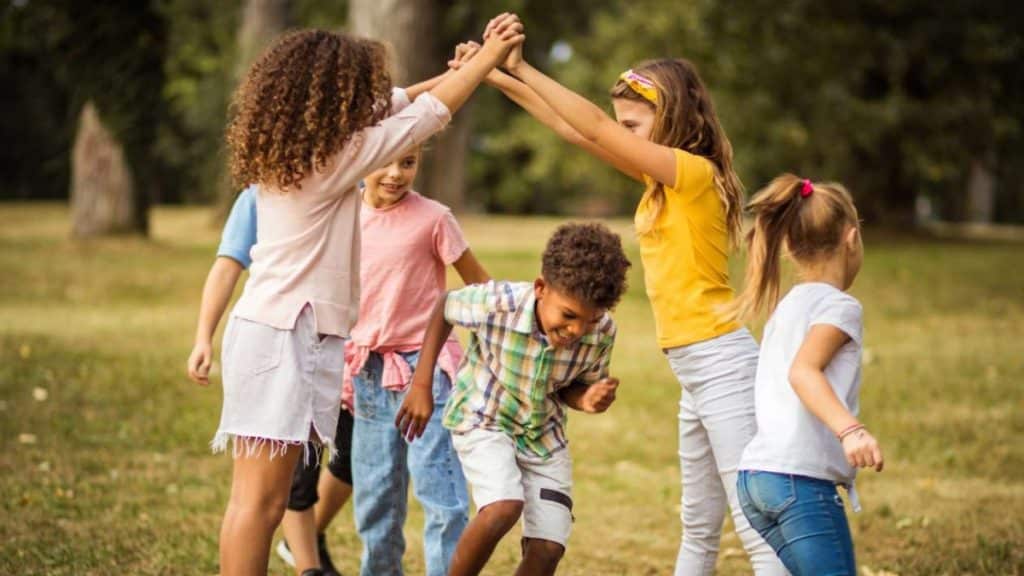Engaging in play is so much more than an entertaining pastime for children. It’s also a crucial activity for their physical, emotional, and cognitive development. Any type of play can be beneficial, but unstructured free play is especially important for optimal child development.
While most parenting guides include information on managing emotional swings and watching for specific developmental milestones, they rarely discuss the need for free play. Here’s what you should know about the importance of unstructured time and why it’s essential for your child’s development.
What Is Free Play?
As the name suggests, free play is any type of creative recreation where the child is free to choose what activities they want to engage in. The idea is to let them decide where, how, and with what they want to goof off — without an adult dictating what they do. An adult may periodically give suggestions, but the child is in control of the experience.
Children can have fun with practically anything, from building blocks to playground equipment. Yet, many don’t even need standard toys or equipment to create their own fun. As long as they have a healthy imagination, kids can turn practically any object into a useful prop in their creative inner storyline.
Examples of Unstructured Play
Unstructured play doesn’t come with any predetermined rules. It’s spontaneous, engaging, and can sometimes be chaotic. It can be as simple as climbing a tree or as complicated as a child-developed superhero scenario where every room in the house becomes a different part of the “set.”
Other examples include stacking blocks or creating blanket forts without adult guidance. Finger painting, making crafts with objects found in nature, or exploring a new environment can also be great options.
Why Free Play Is Crucial to Childhood Development
Now that you know what unstructured play is, you may be wondering why it’s important to make sure your child engages in it regularly. Reserving time for free play is crucial because it offers the following developmental benefits:
- Increases problem-solving capabilities: As children encounter problems during unstructured recreation, they learn how to work toward solving them on their own.
- Encourages healthy expression: Kids who independently have fun learn how to express their emotions in a healthy way.
- Boost motor development: Building with blocks and other tactile objects improves motor development in young ones.
- Encourages independence: Kids learn independence by being in charge of their own playtime experiences.
- Builds resilience: Young people may experience failures and drawbacks when navigating free time alone. Learning how to keep trying and solving problems can help build resilience.
As with all things in life, maintaining a balance between structured and unstructured activities is essential. Both offer unique benefits that can help young people develop into well-rounded adults.
How to Encourage Unstructured Play
Some children have an easier time engaging in unstructured activities than others. If you have a little one who expects you to dictate everything that happens during playtime, here are a few things you can do to encourage their creativity.
Limit Screen Time
Too much screen time can squash a kid’s imagination and make it harder for them to behave creatively. Therefore, it’s in their best interest to have screen time limits. If you establish clear rules regarding electronic use, your children will get used to putting down their controllers at a certain time. Free from the restrictions of electronics, they’ll become more comfortable using their imaginations to create screen-free fun.
Provide a Safe Environment
Some kids may not feel safe with unstructured play. You can help increase their comfort level by giving them a safe environment to explore and interact with. This could be a room in the house where they’re free to engage with everything in sight. It could also be a backyard that’s free from potentially dangerous items like lawnmowers, garden chemicals, and sharp tools.
Ask Your Child What They Want to Do
If your little ones rely on you to come up with ideas and activities to entertain them, make it a habit to ask them what they’d like to do. At first, they may have trouble coming up with ideas. You could provide a variety of suggestions, but let them make the final activity selection. You might need to help them get started with their activity of choice. But once they begin playing, make it a point to step back and simply observe.
Accept the Possibility of Messes
Free play is often chaotic and messy, so it’s important to accept that possibility as a parent. Whatever activity your child picks may end up with paint, glue, or food all over the floor and possibly all over themselves. You can make cleanup easier by setting down painter’s plastic or fabric in the area. Dressing your kids in worn-out recreation clothes can also minimize your stress. You won’t worry as much about paint or mud stains if your kids aren’t wearing their nice school clothes.
As a parent or caregiver, it’s so important to recognize the vital role of free, unstructured play in healthy child development. There is much you can do to help the young people in your life engage in imaginative exploration. You can start by stepping back and letting children decide how, where, and when they want to have fun and explore. Encouraging children to be creative and curious will ultimately help them become capable, resilient, and imaginative adults.
